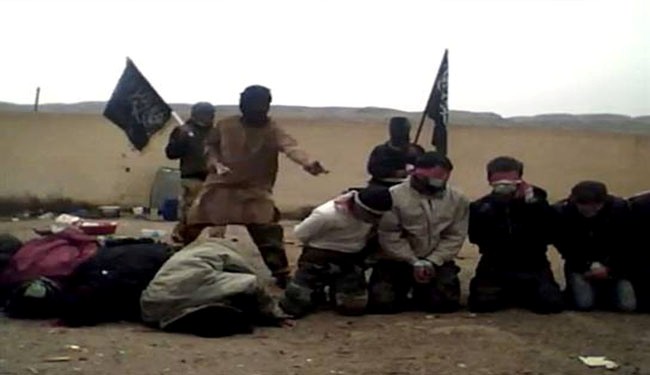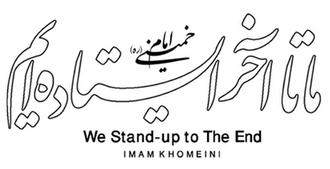۲۵ شهریور ۹۲ ، ۲۲:۰۳
Half of Syria Militants Extremists
Daily Telegraph: Half of Syria Militants Extremists, Linked to Al-Qaeda
Local Editor
Almost half of the armed groups forces fighting against the Syrian government are hardliners or extremists with al-Qaeda links, according to a new study due to be published this week.
 Split into around 1,000 fragmented cells, the Syrian opposition consists of at least 10,000 fighters who are extremists with strong links to al-Qaeda, while another 35,000 are hardliners, according to analysis by defense consultancy IHS Jane's.
Split into around 1,000 fragmented cells, the Syrian opposition consists of at least 10,000 fighters who are extremists with strong links to al-Qaeda, while another 35,000 are hardliners, according to analysis by defense consultancy IHS Jane's.
The difference between extremists and hardliners, the Telegraph reports is that the latter concentrates only on the Syria, while extremists groups have a global outreach. A further 30,000 opposition fighters belong to more moderate groups that have a so-called Islamic character.
The study, based interviews with militants and on intelligence estimates, concludes that around 100,000 militants are involved with the opposition forces.
"The insurgency is now dominated by groups which have at least an extremist viewpoint on the conflict," Charles Lister, author of the analysis told the Telegraph. "The idea that it is mostly secular groups leading the opposition is just not borne out."
Al-Nusra Front and the so-called Islamic State in Iraq and the Levant (ISIL) are two dominant groups that have al-Qaeda links and are gaining momentum on the ground.
"Because of the extremist make up of such a large proportion of the opposition, the fear is that if the West doesn't play its cards right, it will end up pushing these people away from the people we are backing," Lister said.
The issue of Western support to the opposition has long raised questions over the fears arms might fall into terrorist hands.
ISIS has also begun a program of "indoctrination" of civilians in armed groups-held areas, trying to educate Syria's traditionally moderate Sunni Muslims into a more hardline view.
In early September, the group distributed black backpacks with the words "Islamic State of Iraq" stamped on them. They also now control schools in Aleppo.
"It seems it is some sort of a long-term plan to brainwash the children and recruit potential fighters," said Elie Wehbe, a Lebanese journalists who is conducting research into these activities.
As if trying to help the West separate hardcore militants from moderate opposition, al-Qaeda leader Ayman al-Zawahri addressed his brothers on Sunday, calling on them to avoid allying with other rebel fighters backed by Gulf Arab states and the West.
"I warn my brothers and people in the Syria of unity and jihad against coming close to any of these groups," Zawahri said.
Meanwhile, in the past two weeks the US has reportedly begun delivering arms to militants battling the Syrian government.
The CIA has been entrusted to monitor the delivery of arms to insure that it does not end up in the hands of al-Qaeda associates.
The agency controls and tracks the delivery of reportedly light weapons and other munitions via countries bordering Syria, such as Turkey and Jordan.
Almost half of the armed groups forces fighting against the Syrian government are hardliners or extremists with al-Qaeda links, according to a new study due to be published this week.
 Split into around 1,000 fragmented cells, the Syrian opposition consists of at least 10,000 fighters who are extremists with strong links to al-Qaeda, while another 35,000 are hardliners, according to analysis by defense consultancy IHS Jane's.
Split into around 1,000 fragmented cells, the Syrian opposition consists of at least 10,000 fighters who are extremists with strong links to al-Qaeda, while another 35,000 are hardliners, according to analysis by defense consultancy IHS Jane's.The difference between extremists and hardliners, the Telegraph reports is that the latter concentrates only on the Syria, while extremists groups have a global outreach. A further 30,000 opposition fighters belong to more moderate groups that have a so-called Islamic character.
The study, based interviews with militants and on intelligence estimates, concludes that around 100,000 militants are involved with the opposition forces.
"The insurgency is now dominated by groups which have at least an extremist viewpoint on the conflict," Charles Lister, author of the analysis told the Telegraph. "The idea that it is mostly secular groups leading the opposition is just not borne out."
Al-Nusra Front and the so-called Islamic State in Iraq and the Levant (ISIL) are two dominant groups that have al-Qaeda links and are gaining momentum on the ground.
"Because of the extremist make up of such a large proportion of the opposition, the fear is that if the West doesn't play its cards right, it will end up pushing these people away from the people we are backing," Lister said.
The issue of Western support to the opposition has long raised questions over the fears arms might fall into terrorist hands.
ISIS has also begun a program of "indoctrination" of civilians in armed groups-held areas, trying to educate Syria's traditionally moderate Sunni Muslims into a more hardline view.
In early September, the group distributed black backpacks with the words "Islamic State of Iraq" stamped on them. They also now control schools in Aleppo.
"It seems it is some sort of a long-term plan to brainwash the children and recruit potential fighters," said Elie Wehbe, a Lebanese journalists who is conducting research into these activities.
As if trying to help the West separate hardcore militants from moderate opposition, al-Qaeda leader Ayman al-Zawahri addressed his brothers on Sunday, calling on them to avoid allying with other rebel fighters backed by Gulf Arab states and the West.
"I warn my brothers and people in the Syria of unity and jihad against coming close to any of these groups," Zawahri said.
Meanwhile, in the past two weeks the US has reportedly begun delivering arms to militants battling the Syrian government.
The CIA has been entrusted to monitor the delivery of arms to insure that it does not end up in the hands of al-Qaeda associates.
The agency controls and tracks the delivery of reportedly light weapons and other munitions via countries bordering Syria, such as Turkey and Jordan.




